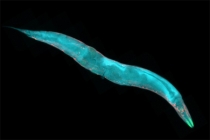
A team of NIH-funded scientists used worms to discover a surprising biological system that counteracts the effects of opioids, offering a potential new target for improving the safety of opioid pain relievers.
Opioids target the μ-opioid receptor (MOR) to reduce pain, but they also carry a risk of addiction. Since the soil dwelling nematode C. elegans does not normally have the MOR gene, the scientists artificially inserted it into the worm’s DNA, making the animals responsive to opioid medications like morphine and fentanyl. The researchers then exposed the worms to gene-disrupting mutagens, identified animals that exhibited altered opioid responses due to these mutagens, and used sequencing and gene editing techniques to pinpoint the genes responsible.
The investigators identified the worm gene for the orphan receptor GPR139, which is also present in mice and has anti-opioid activity. When they gave mice compounds that activated GPR139, they were able to counteract morphine-induced pain relief and reward. When they deleted the GPR139 gene, they increased morphine-induced pain relief and decreased the development of physical dependence and withdrawal to chronic morphine, indicating GPR139 could be a useful target for increasing opioid safety.
Not only can these findings potentially transform our understanding of opioid signaling, they also demonstrate the potential of using the simple worm C. elegans as a platform for genetic discovery.
The project was conducted by scientists at Scripps Research in Florida and the University of Kansas and recently published in the journal Science. It was funded by NIDA as well as the National Institute of General Medical Sciences (NIGMS).
Study:
- Dandan Wang, Hannah M. Stoveken, Stefano Zucca, Maria Dao, Cesare Orlandi, Chenghui Song, Ikuo Masuho, Caitlin Johnston, Karla J. Opperman, Andrew C. Giles, Matthew S. Gill, Erik A. Lundquist, Brock Grill, Kirill A. Martemyanov. Genetic behavioral screen identifies an orphan anti-opioid system. Science.
